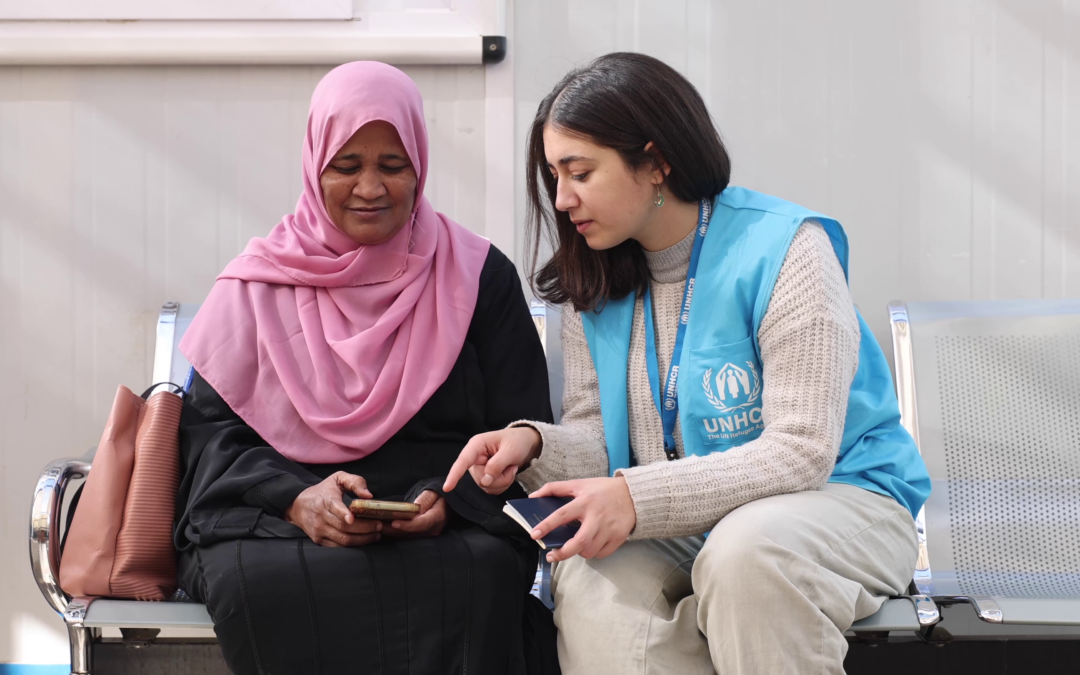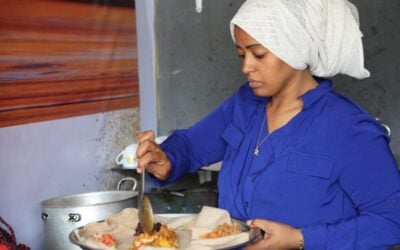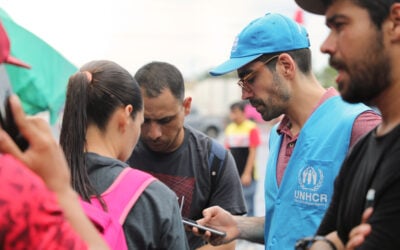Data Blog
Advancing the collection and use of data to inspire solutions for forced displacement

Revolutionizing refugee registration: The Digital Gateway in Egypt
By Simon Pierre Diouf and Raad Shaqman A Sudanese asylum-seeker is being assisted by a UNHCR staff member to use the new registration tool. ©UNHCR/Pedro Costa Gomes In August 2024, UNHCR Egypt launched the Digital Gateway to...
Key highlights from the latest UNHCR Refugee Education Research Digest
UNHCR’s latest review of refugee education identifies three key areas for transformative progress: strengthening refugee leadership, investing in teachers, and thoughtfully adapting technology to meet the unique needs of refugee students.
Measuring foundational learning in forced displacement: field insights and lessons from Mexico
Education officers from UNHCR were recently in Tapuchula and Tijuana to assess foundational learning outcomes for forcibly displaced children.
Shining a spotlight on Nicaraguans’ poverty and wellbeing in Costa Rica
Evidence indicates that integrated policies to improve employment, social inclusion, and access to services for Nicaraguan refugees in Costa Rica would benefit both them and the host country through social and tax contributions.
A data-driven look at how promoting employment fosters refugee mental health
As we mark World Mental Health Day, it is important to recognize the disproportionate impact of mental health issues on refugees. This blog examines the links between mental health and livelihoods for refugees, suggesting that integrating mental health support with livelihoods programmes can enhance their ability to work.
Improving solutions to forcible displacement through evidence: learning from impact evaluations in East Africa
Impact evaluations in East Africa are providing critical insights into what works—and what doesn’t—when supporting people affected by forced displacement. But there remains significant gaps in evidence.
Getting financial service providers “refugee-ready”: four lessons From Uganda
Sida, UNHCR and Grameen Credit Agricole Foundation launched a first-of-its-kind blended finance programme in Uganda. Some key learnings emerged from the successful initiative.
Innovation and partnerships to improve socioeconomic data on forced displacement
Nicci Potts, ODA Programming and Partnerships Lead Adviser, UK Foreign Commonwealth and Development Office, at the Royal Statistical Society Conference 2024. By Sarchil Qader, Nicci Potts, Giulia del Panta and Paddy Brock We don’t have time for business as usual....
UNHCR’s photo quality initiative: enhancing photo standards in refugee registration
Ukrainian refugees at a UNHCR Registration Center for financial assistance in Bucharest. Once registered they will receive a pin to their phone which allows them to withdraw the cash at a local store. ; Each individual receives 568 Romanian Leu ($123). The center so...
Closing the gap: zooming in on refugee women on Equal Pay Day
Evidence suggests that while living in countries with gender disparities, refugee women usually earn less than host women. Addressing these disparities requires policies that target the specific challenges faced by all women in host countries. and integrating a gender perspective into refugee strategies.
The future is data (and it’s here already)
At the end of September 2024, world leaders are coming together in New York City to convene a variety of high-level events. Between 22-23 September, the Summit of the Future will take place, which has been described as a once-in-a-generation opportunity to mend eroded trust and demonstrate that international cooperation can effectively tackle emerging threats as well as opportunities.
About the blog
The UNHCR Data Blog brings attention to data and research on protecting the rights and wellbeing of people forced to flee. It is also a forum to discuss research innovations in data-scarce forced displacement settings.
Useful links
UNHCR Data Transformation Strategy 2020 – 2025
UNHCR Socioeconomic Data and Analysis
Guidance on Registration and Identity Management
Registration and Identity Management at UNHCR
Socioeconomic Assessment Toolkit
Orientation for the early stages of planning a socioeconomic survey
Guidance on sampling household level surveys from UNHCR proGres registration data










